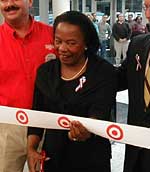Profile: Sharon Sayles Belton
By Art Hughes
Minnesota Public Radio
October 24, 2001
Minneapolis Mayor Sharon Sayles Belton is in a tight race in her bid for a third term in office. The city enjoys relative economic prosperity, crime is low and, by all accounts, the mayor has delivered on what she's promised. But Sayles Belton has had trouble turning that message into voter support. Some blame it on the difficulty for anyone trying for a third term. Other observers say she's being out-maneuvered by an energetic and better-organized challenger. But even those close to the mayor say a big reason voters aren't getting the message is because she isn't good at presenting it.
| |
|
|
|
||
There's little question Sayles Belton knows the issues. On the University of Minnesota campus, the mayor talks to a handful of students assembled by the College Democrats. These are her people: liberal, committed, optimistic. But after 35 minutes packed solid with subjects such as building political coalitions and moving the concrete crusher from the gateway of the city, her audience drifts.
At one point, Sayles Belton says her strong point is getting things done, not necessarily playing to any particular audience.
To U of M political science junior Zach Coelius, that much is obvious. "If I was looking at it as just a student of politics, I'd say that's very interesting. She gave an important speech and said a lot of things that are important to a lot of people. They're just not important to me. I think if you're going to give a speech, you should give a speech to your audience," Coelius said.
But more than forgetting her audience, Sayles Belton is often faulted for keeping a low profile and avoiding the spotlight.
"I think the mayor is rightly criticized for not promoting herself and her achievements. She's not a self promoter," says Hennepin County Commissioner Peter McLaughlin, co-chair of Sayles Belton's campaign - his third time doing so. "She's getting better at it, though. She now tells the story. I don't think she's spent a lot of energy telling that story over the eight years in office."
| |
|
|
|
||
He says her election in 1993 as the first African-American and the first woman mayor of the city was historic. But he says now that she has achieved that pinnacle, she faces the same political burdens as any other candidate seeking a third term.
"Now she's got eight years worth of barnacles. When you're mayor of a major city in the U.S., you pick up barnacles if you're doing anything that's worth doing," McLaughlin says.
Those barnacles, McLaughlin says, include leading the charge for a downtown Target store that cost the city $60 million, another $30 million Block E entertainment complex, and even the lingering picture of police dressed in riot gear pepper spraying protestors in the city's streets.
Bill English, head of the Coalition of Black Churches and a long-time Sayles Belton supporter, says there are racial factors at play. English says the mayor retains support in predominantly black and working-class parts of the city. But issues like the Target store give many white voters a reason to vote against her.
"The only people in the city who are somewhat peeved by that and are using that as an issue are people in the southern part of the city. The more affluent wards," English says. "What I know is the laboring people in this city appreciate it. The lesser people in the city appreciate it. The northern part of the city appreciates it. And I think they're going to pull her through."
English and McLaughlin both say the mayor can take credit for completing ideas, such as the Target store and the Block E project, that had languished for decades.
East Hennepin Avenue is seeing a renaissance in housing and business development, the Milwaukee Depot was renovated into a hotel and skating rink. Housing and parks are making the riverfront more attractive and vital.
Speaking on Minnesota Public Radio's Midday, the mayor typically used the word we to cite the successes of her time in office. "Good things are happening in downtown because we have advanced strong and bold leadership that says a downtown is strong and healthy and works 24 hours a day is the kind of downtown we want to have. We don't want the carpet to roll up at 4:30 like it does in other cities. We got a good thing going and we're going to work it hard and make it and help it work for all of us," she said.
While clearly not uncomfortable in public, Sayles Belton seems to gain more traction in smaller groups. Recently, she sat at the head of a table in a North Minneapolis restaurant that leans toward dark wood and red velvet. She's flanked by former mayor Al Hofstede and a local labor secretary in addition to two union workers who lost their jobs in the economic downturn following September 11th.
After being denied the DFL Party endorsement and coming in second in the primary, Sayles Belton needs the unions for both money and volunteers and such meetings help keep those fires burning. At one point the mayor got up to greet other restaurant guests and handed out buttons for the hotel and restaurant workers union.
Sayles Belton chatted amiably as she moved from table to table and most patrons seem to recognize her. Which, from a campaign standpoint is a good thing, since she doesn't volunteer her name and neglects to ask for their vote in November.
More from MPRMore Information


